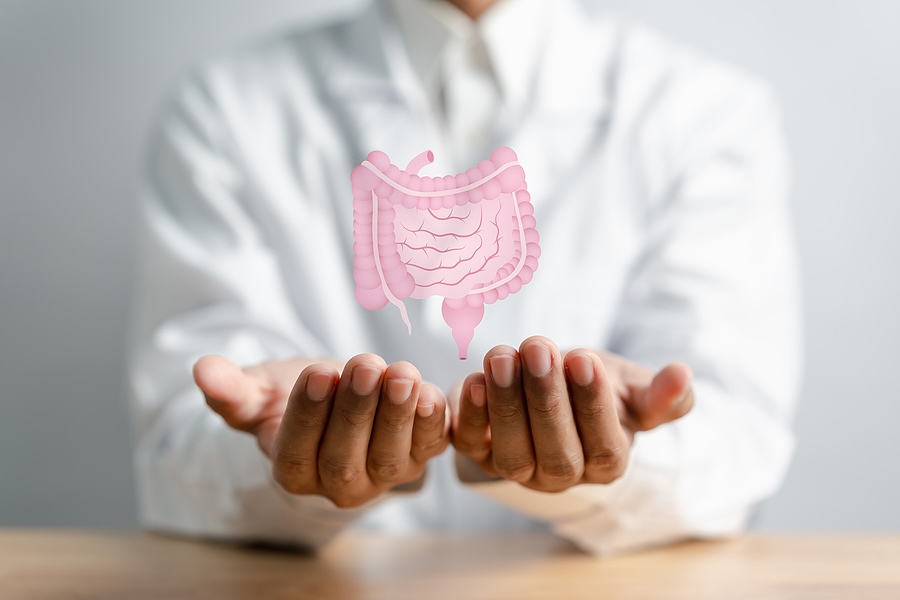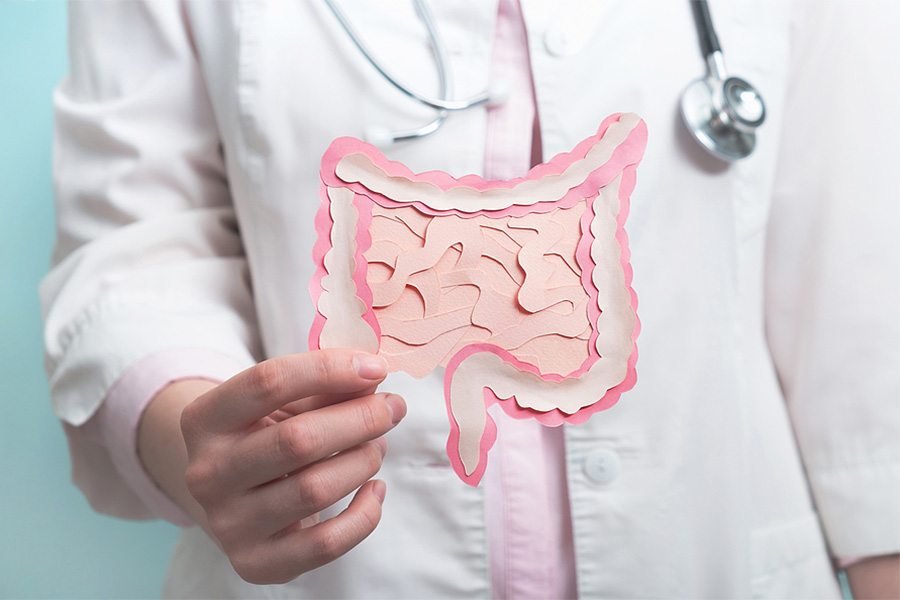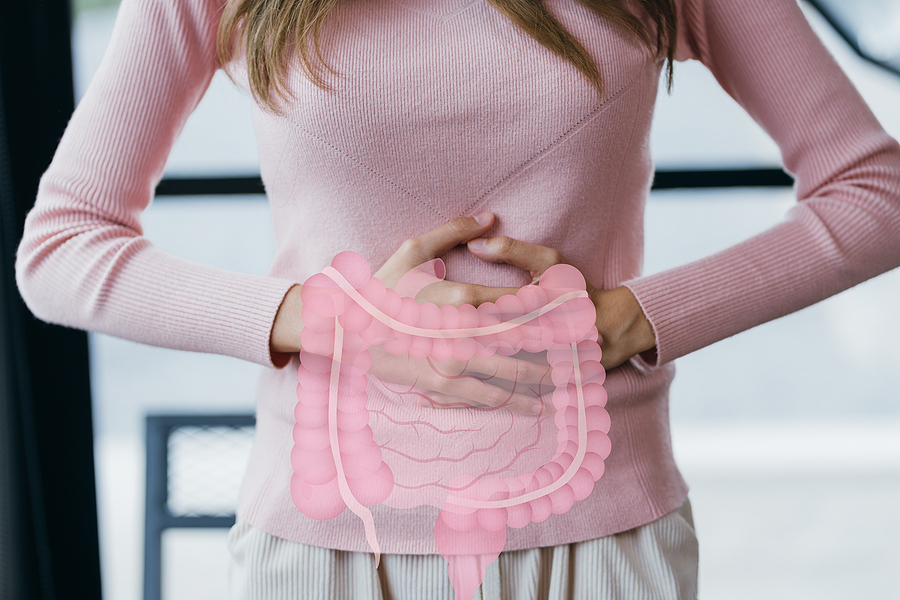Updated: June 29th, 2025
- Slow metabolism does not make losing weight impossible.
- Basal metabolic rate (BMR) is only half the story; how much energy you use beyond basic function matters for weight loss.
- A healthy gut microbiome leads to healthy metabolic function.
- Balancing the bacteria in your gut improves metabolic function.
- The top three ways to encourage a healthy gut microbiome are eating for gut health; reducing stress; and supplementation.
“It’s no use,” said my client, Meg. “My metabolism is too slow. I’ve tried everything I can to lose weight, but it’s just not happening. I guess it’s time to give it up and accept my body the way it is.”
Now, there IS power in loving the body you have, but I absolutely disagreed with the rest of Meg’s statement. I’d been here before, with countless women, and I knew that I could help her. I just needed her to pause, understand a little more about metabolism and how it works, and trust me to show her how she could change habits to help her metabolism work with her body, not against it.
For too long, women have heard the words “slow metabolism” and thought there’s nothing they can do about it. But that’s simply not true. It certainly isn’t easy, and there are no “quick-fix” solutions, despite what the advertising industry would like you to believe. Fad diets aren’t a long-term solution. Anything that causes you to drop a huge amount of weight in a week or two is a drastic, temporary measure.
If your only goal is to fit in a specific dress for a big event, a fad diet might meet your need, though it’s unhealthy and can cause bigger problems, so I don’t advise these crash diets. And if you want to heal the root cause of your weight issue and bring your metabolism to optimal functioning, it’s going to take time, commitment, and a willingness to look at the bigger picture.
One important issue I have to address with all of the women who come to see me is the health of their gut microbiome. That’s because it’s a key factor in achieving good health.
Your microbiome impacts inflammation, digestive health, and a range of other conditions. And it also impacts weight loss. Research is consistently connecting the gut microbiome to healthy metabolic functioning.
Let’s take a look at how metabolism can impact weight loss, the connection between your gut microbiome and metabolism, and how balancing the bacteria in your gut can finally lead to weight loss success. Then I’ll give you my top three lifestyle tips for balancing your gut to increase your chances of reaching your goal weight naturally.
How metabolism affects weight
You can’t really understand the impact of metabolism on weight unless you have a clear idea of what metabolism is. The simplified explanation is that metabolism is a set of chemical processes in living things that sustains life. So metabolism isn’t all about weight, but it does play a key role in how we process and store energy from the food we eat.
Because metabolism also impacts so many other body functions, making sure these processes are working exactly as they should be can also improve how you feel in general.
When you feel great, it’s much easier to make healthy choices to keep feeling great, which also keeps your metabolism functioning well. Instead of a “vicious” cycle, it’s a cycle you want to maintain.
Metabolism has two categories: anabolism and catabolism. Anabolism is a series of chemical reactions that build up molecules by using energy. Anabolism uses certain hormones (like insulin, estrogen, testosterone, and human growth hormone) to create something – like bone or muscle mass. Catabolism, on the other hand, uses biochemical processes to break down molecules and turn them into energy, such as breaking down proteins into amino acids to produce glucose, nucleic acids, and carbohydrates.
The Basal Metabolic Rate (BMR) is the amount of energy these processes use when you are at rest. Put another way, it’s the amount of energy you need just to maintain basic body functions like circulation, breathing, body temperature, and brain function. Half of the calories you burn each day are burned by these basic functions.
You don’t have much control over your BMR. But you CAN control how many other calories you burn through a range of healthy lifestyle habits.
The link between metabolism and weight loss
Simply stated, if our bodies produce more energy than we use, that excess will be stored as fat. These fat cells, when unused, actually slow the metabolism and that’s when you hang on to extra pounds.
It’s not quite as simple as it may seem though. The old “calories in-calories out” mindset doesn’t work for a lot of people because calories from different kinds of food interact differently in our bodies – and every person’s body is different!
That’s why I don’t tell my clients that if they just eat less and move more, they’ll lose weight. They know it’s not true, and so do I! To actually impact our metabolism in ways that will aid in losing weight, we need to really understand good nutrition that is right for the unique needs of our own bodies.
Eating prompts our bodies to use energy to digest and absorb nutrients. It’s another cycle: energy is required to function. Eating and moving use energy, so more energy must be made to continue functioning. And there’s a lot going on throughout this process: raw materials are broken down, new molecules are created, waste is generated, energy is used, toxins are excreted, and fat is stored to use later.
That’s why both healthy food and enough movement are crucial to a healthy metabolism. Exercise that you enjoy can keep you moving enough to use up stored energy and build muscle mass, allowing for a more efficient metabolism.
But there’s more to it than that…other factors, including your gut microbiome, can throw things off course.
How the Gut Microbiome Impacts Metabolism
Research has shown that the composition of your gut microbiome is important to many aspects of health, including metabolism. Poor diversity in the microbiome can have a serious impact on weight.
Bacteria in the gut produce metabolites and have structural components that function as signaling molecules to many cell types. Some of these cells produce and secrete hormones that play a key role in regulating metabolic processes. If the balance of bacteria is skewed, the wrong messages can be sent to these cells, altering metabolic function.
Studies in mice have revealed that shifting microbiome composition to reduce certain types of bacteria results in improved metabolic outcomes.
Other animal research has shown that the microbiome affects the way the body is able to extract energy from food consumed. In one study, mice that received microbiota transplants from obese mice gained about twice as much body fat as mice receiving microbiota from lean donors, even as they consumed the same amount of calories.
Human research has also uncovered more than 300 microbial genes associated with obesity. In one human study, researchers identified distinct networks of genes associated with obese individuals, and others associated with lean individuals. Many of the network genes linked to obesity are involved in both carbohydrate metabolism and xenobiotic metabolism.
Because research has shown that the microbiome can impact the way calories are stored, and what we eat can impact the microbiome, genetic testing can offer a better picture of what may work for each individual person when it comes to weight loss. Nutrition can’t be overgeneralized, as so many diet plans seem to do. A low fat diet might work really well for one person, and not at all for the next. There certainly IS a nutrition plan that will help in achieving weight loss goals – but your ideal plan may look much different than that of your best friend.
Balancing the microbiome to boost metabolism and lose weight
One thing that has become clear in gut research is that a diverse gut – one that has a wider range of bacterial strains – is often much healthier than one with fewer strains. The research also supports the idea that obesity is associated with lower diversity in the gut.
When it comes to losing weight, the ability to properly digest specific things, such as fiber and certain antioxidants, is also important. Your body needs certain microbes to digest these things, so when balance is off, digestion is poor.
Gut bacteria can also impact how your intestine absorbs the fats you eat, which can have a big impact on how your body stores that fat.
All of this shows why having a healthy gut microbiome is a critical factor in successful weight loss.
3 tips to balance the microbiome
Now that you know why a healthy, balanced gut is important when trying to lose weight, here are my top three tips for achieving that balance.
1. Eat for a healthy gut
I firmly believe that food is the best medicine we have – for any condition! Food is especially important in keeping your gut microbiome thriving and balanced, so it can do its best job for your body. That’s why crash diets are such a bad idea – they might be eliminating things you need to maintain the proper balance of gut bacteria.
Complex carbohydrates and fiber are essential, for instance. Fermented foods are also important in resupplying your body with the beneficial bacteria it needs to stay balanced.
On the flip side, simple carbohydrates and sugar will quickly throw that balance off, as will the chemicals in processed foods.
My best advice for a healthy gut is to regularly eat organic whole foods – and not just a few. Variety adds flexibility to the microbiome, which then supports your ability to indulge in an occasional treat. And remember – every single meal is a new opportunity to support, not sabotage, your body.
2. Slow down and let go of stress
I’m sure you know that stress can wreak havoc on your health. But do you know how to reduce the stress your body experiences to help balance things out? If not, now is the time to learn! You have the power to heal your gut, but you have to start with being conscious of the impact your lifestyle choices have.
Your body perceives all stress the same way. That means that even if you aren’t worried about where your next meal will come from or whether you’ll have a job next week, it’s critical to recognize that trying to do too much, or caring for too many other people without thinking about your own needs can also have an impact.
Each and every day, carve out some time for yourself. Meditate, exercise, breathe deeply, or participate in an activity that brings you joy. Allow yourself time to sit and simply BE. Practice gratitude by writing down three things each day you are thankful for. Stop work a few minutes early and play with your children. Whatever it is that brings a smile to your face and calm to your body will work. But you have to find time to relax every day to see the difference you’re looking for in your gut health.
3. Use targeted supplements to help you heal
I wish that our bodies could get everything they need from the food we have available. But with modern farming practices and an abundance of processed foods, that’s often just not possible. The solution, then, is to be intentional about how we help our body out by choosing high-quality, pharmaceutical grade supplements.
When balancing the gut is your goal, in addition to a daily multivitamin, you may need to take a good probiotic, which can help maintain the desired bacterial diversity in your gut. It’s best to limit antibiotic use, but if you have to take one, probiotics are especially important. Prebiotics can help feed the beneficial bacteria, allowing them to flourish.
Digestive enzymes can also support your digestive tract. Consider working with a functional medicine practitioner to determine the best supplements for your unique situation.
So, you ask, what happened with Meg? Did she just throw in the towel and live, unhappily, with the weight she was at when she came to see me? Absolutely not! I worked with Meg to educate her on how her gut health could be impacting her progress, something she’d never considered before.
After considering all the options, Meg tried my comprehensive weight loss program, which addresses not only gut health, but all the important factors in successful weight loss – including how to KEEP it off. I’m happy to say that after fully embracing the program and putting in the effort required, Meg reached her goal weight. And she feels so good now that she’s committed to maintaining the habits that keep her slim and keep her gut healthy.
I’ve helped so many women find this relief and success – and I want to help you too. Learn more about my transformative program.









